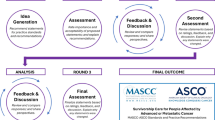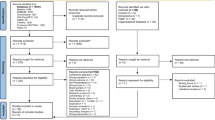Abstract
Goal
Men diagnosed with prostate cancer experience high decision-related distress concurrent with cancer-related distress. Psycho-education, problem solving and decision support were integrated in a novel telephone-delivered supportive care intervention targeting men at diagnosis and assessed for feasibility.
Materials and Methods
An exploratory single-group pre–post-test design tracked session frequency, duration and content. Standardised measures assessed decisional conflict, cancer-related distress and decision involvement. Brief screening measures for psychological and decision-related distress were incorporated into the intervention protocol. Twenty men (77% response) newly diagnosed with localised prostate cancer received the intervention.
Results
Men who were undecided about treatment at study entry required more pre-treatment intervention calls (p < 0.013). Pre-treatment support calls were longer (M = 40.2 min) and more complex by comparison to post-treatment calls (M = 30.9 min; p < 0.002). Brief screening for decision-related distress correlated with concurrent (p < 0.008) and prospective (p < 0.046) decisional conflict. Decisional conflict and intrusion decreased at post-test (p < 0.001; p < 0.005). Men reported a high level of satisfaction with the support received with benefits identified including anonymity and accessibility.
Conclusions
In this setting, a tele-based supportive care and decision support intervention for men newly diagnosed with prostate cancer was feasible. The use of brief screening measures as within-intervention clinical tools appears promising.
Similar content being viewed by others
References
Ashton WA, Fuehrer A (1993) Effects of gender and gender role identification of participant and type of social resource on support seeking. Sex Roles 28:461–476
Australian Cancer Network Working Party on Management of Localised Prostate Cancer (2002) Clinical Practice Guidelines: Evidence-based information and recommendations for the management of localised prostate cancer. National Health and Medical Research Council, Canberra, Australia, pp 1-137
Australian Institute of Health and Welfare, Australasian Association of Cancer Registries (2004) Cancer in Australia 2001. AIHW cat. no. CAN 23. Australian Institute of Health and Welfare, Australasian Association of Cancer Registries, Canberra, Australia
Broadstock MJ, Hill D (1997) Evaluation and impact of promotion of a cancer helpline to cancer patients through their specialists. Patient Educ Couns 32:141–146
Burger M, Steginga SK, Williams S, Gardiner RA (2006) Prostate Cancer. Endotext.com ‘Your Endocrine Source’ (Chapter 10). Accessed on 21 May 2007 from http://www.mdtext.com/male/male10/male10.pdf
Carlson LE, Bultz BD (2003) Cancer distress screening: Needs, models, and methods. J Psychosom Res 55:403–409
Clinical Oncological Society of Australia, The Cancer Council Australia, National Cancer Control Initiative (2003) Optimising Cancer Care in Australia. National Cancer Control Initiative, Melbourne, Australia, pp 122
Collie K, Kreshka MA, Ferrier S, Parsons R, Graddy K, Avram S, Mannell P, Chen X, Perkins JJ, Koopman C (2007) Videoconferencing for delivery of breast cancer support groups living in rural communities: A pilot study. Psychooncology 16:778–782
Creamer M, Bell R, Failla S (2003) Psychometric properties of the Impact of Event Scale - Revised. Behav Res Ther 41:1489–1496
Davison BJ, Degner LF (1997) Empowerment of men newly diagnosed with prostate cancer. Cancer Nurs 20:187–196
Davison BJ, Degner LF, Morgan TR (1995) Information and decision-making preferences of men with prostate cancer. Oncol Nurs Forum 22:1404–1408
Davison BJ, Gleave ME, Goldenberg SL, Degner LF, Hoffart D, Berkowitz J (2002) Assessing information and decision preferences of men with prostate cancer and their partners. Cancer Nurs 25:42–49
Davison BJ, Goldenberg SL, Gleave ME, Degner LF (2003) Provision of individualized information to men and their partners to facilitate decision making in prostate cancer. Oncol Nurs Forum 30:107–114
Evans R, Elwyn G, Edwards A, Watson E, Austoker J, Grol R (2007) Toward a model for field testing patient decision support technologies: A qualitative field testing study. J Internet Res 9:e21
Gielser RB, Given B, Given CW, Rawl S, Monahan P, Burns D, Azzouz F, Reuille KM, Weinrich S, Koch M, Champion V (2005) Improving the quality of life of patients with prostate cancer. Cancer 104:752–762
Helgeson VS (2005) Recent advances in psychosocial oncology. J Consult Clin Psychol 73:268–271
Horowitz M, Wilner N, Alvarez W (1979) Impact of events scale: A measure of subjective stress. Psychosom Med 41:209–218
Hu JC, Kwan L, Saigal CS, Litwin MS (2003) Regret in men treated for localised prostate cancer. J Urol 169:2279–2283
Hutchison S, Steginga SK, Dunn J (2006) The tiered model of psychosocial intervention in cancer: a community based approach. Psychooncology 15:541–546
Kessler L, Fintor L, Muha C, Wun L, Annett D, Mazan KD (1993) The Cancer Information Service Telephone Evaluation and Reporting System (CISTERS): A new tool for assessing quality assurance. J Nat Cancer Inst Monogr 14:61–65
Lechner L, De Vries H (1996) The Dutch cancer information helpline: experience and impact. Patient Educ Couns 28:149–157
Lepore SJ, Helgeson VS, Eton DT, Schulz R (2003) Improving quality of life in men with prostate cancer: A randomized controlled trial of group education interventions. Health Psychol 22:443–452
Marcus A, Garrett KM, Kuluchak-Rahm A, Barnes D, Dortch W, Juno S (2002) Telephone counseling in psychosocial oncology: a report from the Cancer Information and Counseling Line. Patient Educ Couns 46:267–275
McVea KLSP, Minier WC, Johnson Palensky JE (2001) Low-income women with early stage breast cancer: Physician and patient decision making styles. Psychooncology 10:137–146
Mishel MH, Belyea M, Germino BB, Stewart JL, Bailey DE, Robertson C, Mohler J (2002) Helping patients with localized prostate cancer manage uncertainty and treatment side effects: nurse delivered psycho-education intervention over the telephone. Cancer 94:1854–1866
Myers RE (2005) Decision counseling in cancer prevention and control. Health Psychol 24:S71–S77
National Comprehensive Cancer Network Inc. (2002) Practice Guidelines in Oncology-v.1.2002: Distress Management (Rep. No. Version 1). National Comprehensive Network
O’Connor A, Fiset V, DeGrasse C, Graham ID, Evans W, Stacey D, Laupacis A, Tugwell P (1999) Decision aids for patients considering options affecting cancer outcomes: Evidence of efficacy and policy implications. J Nat Cancer Inst Monogr 25:67–80
O’Connor A, Stacey D, Entwistle V, Llewellyn-Thomas H, Rovner D, Holmes-Rovner M, Barry M, Jones J (2004) Decision aids for people facing health treatment or screening decisions (Cochrane Review). The Cochrane Library. Wiley, UK
O’Connor AM (1995) Validation of a decisional conflict scale. Med Decis Making 15:25–30
O’Connor AM, Rostom A, Fiset V, Tetroe J, Entwistle V, Llewellyn-Thomas H, Holmes-Rovner M, Barry M, Jones J (1999) Decision aids for patients facing health treatment or screening decisions: systematic review. Br Med J 319:731–734
O’Connor A (2004) The Ottawa Personal Health Decision Guide. Ottawa Health Research Institute, Ottawa
Occhipinti S, Steginga SK (Under review following revision) The relationship between optimism, coping appraisals, and psychosocial outcomes in men receiving treatment for localized prostate cancer. Health Psychol
Parker C, Muston D, Moss S, Dearnaley D (2006) A model of the natural history of screen-detected prostate cancer and the effect of radical treatment on overall survival. Br J Cancer 94:1361–1368
Penedo FJ, Dahn JR, Molton I, Gonzalez JS, Kinsinger D, Roos BA, Carver CS, Schneiderman N, Antoni MH (2003) Cognitive-behavioral stress management improves stress-management skills and quality of life in men recovering from treatment of prostate carcinoma. Cancer 100:192–200
Ransom S, Jacobsen PB, Booth-Jones M (2006) Validation of the distress thermometer with bone marrow transplant patients. Psychooncology 15:604–612
Rickwood DJ, Braithwaite VA (1994) Social-psychological factors affecting help-seeking for emotional problems. Soc Sci Med 39:563–572
Simon GE, Ludman EJ, Tutty S, Operalski B, Von Korff M (2004) Telephone psychotherapy and telephone care managment for primary care patients starting anti depressant treatment: A Randomised Controlled Trial. J Am Med Assoc 292:935–942
Steginga SK, Occhipinti S (2004) The application of the Heuristic Systematic Processing Model to treatment decision making about prostate cancer. Med Decis Making 24:573–583
Steginga SK, Occhipinti S (2006) Dispositional optimism as a predictor of men’s decision-related distress after localized prostate cancer. Health Psychol 25:135–143
Steginga SK, Occhipinti S, Gardiner RA, Yaxley J, Heathcote P (2004) A prospective study of men’s psychological and decision-related adjustment after treatment for localized prostate cancer. Urology 63:751–756
Thompson SC, Pitts JS, Schwankovsky L (1993) Preferences for involvement in medical decision-making: Situational and demographic influences. Patient Educ Couns 22:133–140
Twomey C (2000) Telephone contacts with a cancer nurse specialist. Nurs Stand 15:35–38
Walsh Scura K, Budin W, Garfing E (2004) Telephone social support and education for adaptation to prostate cancer: A pilot study. Oncol Nurs Forum 31:335–338
Weiss DS, Marmar CR (1997) The Impact of Events Scale - Revised. In: Wilson JP, Keane TM (eds) Assessing Psychological Trauma and PTSD. Guildford, New York, pp 399–411
Acknowledgements
We gratefully acknowledge the contribution of the Northern Section of the Urological Society of Australia and New Zealand and Mrs Sylvia Milner, RN, in the development of this education program. We also acknowledge Ass. Prof Dawn Stacey for her assistance with specialist decision support training for the nurse counsellors.
Author information
Authors and Affiliations
Corresponding author
Rights and permissions
About this article
Cite this article
Steginga, S.K., Ferguson, M., Clutton, S. et al. Early decision and psychosocial support intervention for men with localised prostate cancer: an integrated approach. Support Care Cancer 16, 821–829 (2008). https://doi.org/10.1007/s00520-007-0351-7
Received:
Accepted:
Published:
Issue Date:
DOI: https://doi.org/10.1007/s00520-007-0351-7




